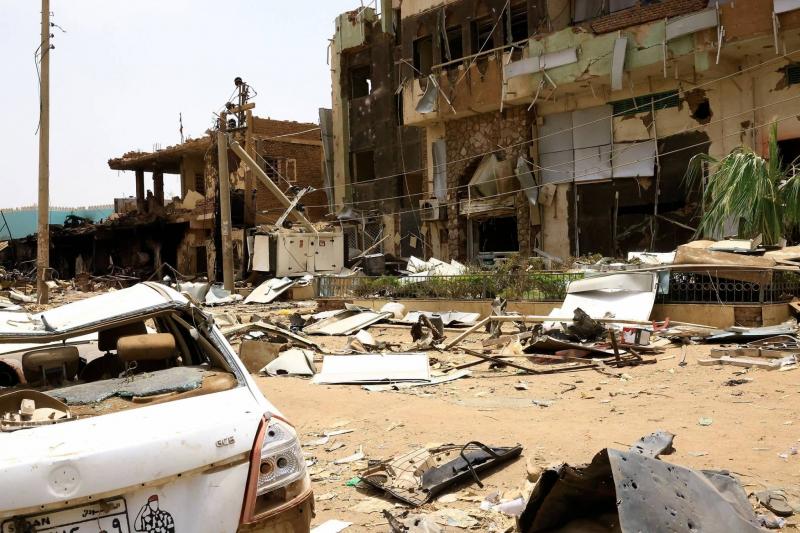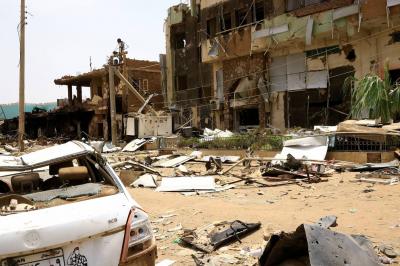South Sudan announced that the warring parties in Sudan have agreed to a ceasefire for seven days starting Thursday, despite increased airstrikes in the Khartoum area undermining the supposed existing truce. Meanwhile, Egypt has entered mediation efforts by hosting a delegation from Sudan's army leader, Abdel Fattah al-Burhan, amid UN fears that the conflict may cross borders.
According to a statement from South Sudan's Ministry of Foreign Affairs, mediation efforts led by President Salva Kiir have resulted in an agreement between the warring parties for a longer ceasefire beginning Thursday and lasting until the 11th of this month, along with the selection of representatives to participate in peace talks.
In an interview with a Japanese newspaper, Egyptian President Abdel Fattah el-Sisi warned that the entire region could be affected. This comes as the Sudanese army envoy met with Egyptian officials in Cairo. Al-Burhan’s envoy to Cairo, Dafa Allah al-Haj, remarked, "No responsible state or government accepts mediation with those who have rebelled against it and destroyed it. Mediation comes in matters less significant than this. When expressed militarily, the government must deal with it militarily. My visit to Cairo aims to enhance cooperation. We may agree on an external mechanism to monitor the truce according to our terms. Any mechanism for monitoring the truce must be discussed with us through the Arab League and the African Union. We have accepted the Saudi-American truce initiative, not mediation to resolve the conflict."
He added, "We will not meet with the Rapid Support Forces face-to-face, but rather through a mediator." He reassured that "tribal conflicts in Darfur arise from conflicting interests, which have been politically exploited, but generally, civil war will not occur in Sudan."
It remains unclear how committed Sudanese Army Chief Gen. Abdel Fattah al-Burhan and the commander of the paramilitary Rapid Support Forces, Gen. Mohamed Hamdan Dagalo, are to adhering to the agreement. Witnesses reported further airstrikes on the cities of Omdurman and Bahri. The Sudanese army stated that the Indian ambassador reported that the embassy was stormed and looted. Additionally, the Saudi Foreign Ministry indicated early Wednesday that the Saudi Cultural Mission building in Sudan had been stormed by an armed group that vandalized equipment and confiscated some property, with no reports of injuries.
The army is bombing Rapid Support Forces units within residential neighborhoods around the capital. The conflict has also spread to the Darfur region in western Sudan, where the Rapid Support Forces emerged from tribal militias that fought alongside government forces to crush dissent in a devastating civil war two decades ago.
Neither military leader shows any signs of backing down; however, they do not seem capable, for now, of achieving a swift victory. The two sides previously shared power in an internationally supported transitional process towards free elections and a civilian government. The Sudanese Ministry of Health reported on Tuesday that 550 people have died and 4,926 have been injured.
Foreign governments are working to conclude evacuation operations, through which they have repatriated thousands of their nationals. The UK stated that its last flight will leave Port Sudan on the Red Sea on Wednesday, urging remaining Britons wishing to leave to head there.
Humanitarian supplies from various aid agencies that reached Port Sudan are still awaiting the opening of a safe passage to Khartoum, a journey of approximately 800 kilometers by land. Nevertheless, Médecins Sans Frontières reported that it has delivered some aid to Khartoum.
The International Organization for Migration estimated that around 330,000 Sudanese have been internally displaced due to the war. Hassan Mohamed Ali, a 55-year-old government employee, shared during a stop in Atbara, 350 kilometers northeast of Khartoum, that Sudanese have lost most of their savings, purchasing power has dropped, and there are no sources of income, describing the situation as catastrophic. He mentioned that they have suffered from power and water outages and that children have stopped attending school, calling the situation in the capital hell.
Displaced Sudanese families are attempting to leave the country, with some walking under the scorching sun through desert areas, managing to cover hundreds of kilometers to reach the borders with Chad or South Sudan.
The UN has warned that 800,000 may eventually leave. Over 40,000 have crossed into Egypt in the past two weeks, but they had to wait days in extreme heat, paying hundreds of dollars for a 1,000-kilometer journey north from Khartoum. The UN stated that the conflict has caused a humanitarian crisis and forced around 100,000 to flee across borders to neighboring countries amidst shortages of food and water.
UN aid official Martin Griffiths stated that he is working to secure commitments from the warring parties in Sudan to provide a safe passage for delivering humanitarian assistance after six trucks laden with humanitarian supplies were looted, undermined by airstrikes in Khartoum for a new ceasefire. Griffiths noted, "It’s a volatile environment, so we need these commitments." He added, "It's not as if we're asking for the impossible. We’re asking for safe passage for humanitarian supplies and people. We do this in every other country even without a ceasefire. It’s common in humanitarian work to go where others do not."




